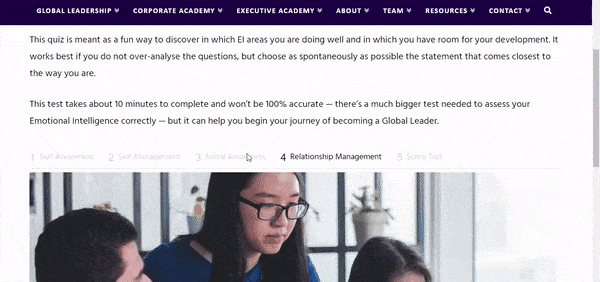How do people with low self-esteem fare as global leaders? Or what of those who are arrogant and think they know it all? Can either of them be successful global leaders?
They can — if they’re willing to work on their “intrapersonal” skills and intelligence. No leader can be successful without self-awareness, introspection and personal reflection, which are the hallmarks of intrapersonal competencies.
“Intra” means “within”, so “intrapersonal” is something that takes place within the self. Intrapersonal competence is about being good at recognizing and interpreting your own emotions and thoughts. This takes both confidence and humility, which is why people with low self-esteem or arrogance will never reach their full potential as global leaders.
In this article, we’re going to take a look at the five main intrapersonal competencies of successful global leaders and how to develop intrapersonal skills and intelligence.
Side note: Intrapersonal competencies shouldn’t be confused with interpersonal competencies. Interpersonal competence is the ability to interact with others. Check out our full article on interpersonal competencies — a.k.a “people skills” — here.
5 Intrapersonal Competencies of Global Leaders
At their most basic level, intrapersonal skills are defined as the following:
- Self-reflection
- Introspection
- Intuition
- Independent thinking
- Strong sense of self
- Firm values and morals
But for global leaders, a.k.a. “extreme leaders”, we must once again go beyond that basic skillset. The above-mentioned intrapersonal skills form the foundation that a global leader needs to build strong intrapersonal competence. Here’s how true global leaders use them to their advantage.

1. Inquisitiveness
As a global leader you have to be willing and eager to ask some difficult questions — about yourself. You have to be curious, interested and inquisitive about how you come across to people, where you need to improve yourself, and how you might do that. An attitude of “that’s just me, there’s nothing I can do about it” won’t cut it for global leaders.
Example questions a global leader might ask are the following:
- How do I want to come across in the upcoming meeting?
- How did I come across in the meeting?
- What could I have done differently?
- What can I do to improve next time?
- How does [person you look up to] handle certain situations?
- Why do people follow [person you look up to]? What about him / her draws me, too? How can I emulate that?
- How can I work on raising my self-esteem and confidence?
- What can I do to come across as less arrogant or defensive?
Part of a global leader’s intrapersonal competence is to be inquisitive enough to ask those questions, find answers to them, and especially act on those answers.
2. Cultivating a Global Mindset
Global leaders must think on a “global” scale. This doesn’t just include leading effectively across borders, but also serving a multitude of diverse stakeholders in a continuously changing complex, uncertain and ambiguous environment. A global mindset also goes beyond understanding cultural differences within your team, but includes understanding differences in business fields and the impact of actions and reactions on various stakeholders.
A global mindset allows leaders to
- innovate in foreign cultures,
- become early movers in global marketplaces,
- coordinate across subsidiaries and regions, and
- understand trade-offs between global standardization and local customization.
Here’s an overview of what having a global mindset requires, that may help you determine in which areas you must focus to improve, build and cultivate your global mindset:
- Intellectually: Global business savvy, cognitive complexity, cosmopolitan outlook
- Psychologically: Passion for diversity, quest for adventure, self-assurance
- Socially: Intercultural empathy, interpersonal impact, diplomacy
Like all intrapersonal competencies, cultivating a global mindset must be intrinsically motivated. A global leader must be willing to recognize where he or she may be lacking, and develop a strategy to improve those areas. Then, of course, they must also follow through on those strategies.

3. Flexibility
Flexibility in leaders is becoming more and more important in our economic and social environment marked by rapid change. Leaders are flexible if they can adjust their leadership style in response to unpredictable circumstances.
Flexible global leaders are able to adapt to change, to revise their plans and overcome challenges, while still achieving their goals. They are willing to try new things and behaviors, even in times of radical change.
Adaptability is also an important element of flexibility. In fact, “flexibility” is defined as the agility in adapting to change. Adaptable global leaders are able to implement new behaviors even in existing, “old” situations, finding new problem solving methods and expressing creativity in their work.
There are ways any global leader can improve his or her flexibility:
- Diagnose before responding
- Taking time out to assess a situation
- Planning ahead
- Clarifying expectations
- Selecting the best people for the job
- Asking for feedback
- Building allies
- Developing conflict management skills
- Effectively managing time
- Helping others set effective goals
The key here is once again to be aware of shortcomings in flexibility and to have the willingness to work on them. Without that awareness or willingness — that inquisitiveness to know more and improve — there would be no growth or development in a global leader’s intrapersonal competence. Which would also make the next intrapersonal competence impossible.
4. Building Character
"Character is not made in a crisis; it is only exhibited."
~Robert Freeman
A person’s character — not to be confused with a person being a character — is composed of three factors:
- Having the right values. For global leaders, these could be respect, humility, tolerance, inclusion, and passion, just to name a few.
- Doing the right thing. Successful global leaders act on their values; they “walk the talk” and lead by example.
- Being the right kind of person by being honest, brave, kind, compassionate, wise, and human, among other things.
Global leaders must continue to show good character even in stressful situations, when the pressure to succeed is high, or a crisis has to be dealt with. They must remain respectful and honest, for example, and continue to live by and up to their values.
And while “character” itself isn’t measurable, it is definitely something that can be improved upon, by
- seeking continual education,
- spreading kindness,
- working on oneself,
- pursuing excellence,
- adding value,
- practicing persistence, and
- being determined.
A good global leader continuously aims to improve his or her character, to be able to remain true to their values even in moments of crises.

5. Creating Resilience
Global leaders must be resilient and dependable, able to work, think and strategize under pressure — which can come from many different directions.
Prioritizing Tasks
Organizations tend to have lots of different priorities that run alongside or even contradict each other, competing for a leader’s attention and resources. Such priorities are often beyond the leader’s control, but nevertheless an integral part of their objective.
We go into the details of how to handle conflicting priorities as a global leader here. You may not have set them, but as a global leader it’s up to you to manage and deliver them, even when all hell breaks loose. This could be someone in your team falling ill, or someone missing a deadline; it could be new urgent tasks coming in when you’re already struggling to complete current ones; or maybe the timeline of a project gets accelerated, meaning you have less time to complete it than originally thought.
In such moments, resilience is the key to keeping your cool and not letting the pressure and stress keep you from restructuring tasks and finding solutions.
Handling Criticism
The higher up the food chain you go, the more criticism will come your way. It’s just a fact of life. Not everybody is going to agree with you and your views or vision — and that’s okay. But if every unkind or critical word aimed at you brings you down, puts you on the defensive, or shuts you up, your success as a global leader stands on fragile ground.
Intelligent people don’t follow yes-men, or someone who won’t face the opposition. As a global leader, you have to be able to see criticism leveled your way as an opportunity to view your cause or vision from someone else’s point of view, to learn something about your opposition, or yes, even to adjust your own opinions and values.
As a global leader, you have to be able to handle even destructive criticism in a constructive way, demonstrating the resilience and ability to not take it personally (even if it’s clearly meant to be), and put aside pride and ego to make the most of it.
Learn to Flex your Intrapersonal Muscles With eurac
As you’ve surely noticed by now, the common thread to improving your intrapersonal competencies as a global leader, is to always be open to
- question yourself and your capabilities,
- analyze and assess your skills,
- come up with a strategy to develop and grow your abilities, and
- follow through on implementing those improvements.
Intrapersonal competencies are difficult to grasp and even more difficult to measure; so without this willingness to grow and make their own change happen, leaders will have a hard time rising to the level of “global”.
That doesn’t mean you have to figure it all out alone. If you feel like you’re stuck, or you simply want professional advice and training, check out eurac’s Corporate Academy, where we develop global leaders for multi-national coprorations.
Or stay up-to-date on global leadership by signing up for our weekly newsletter here:


